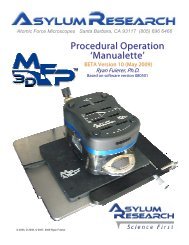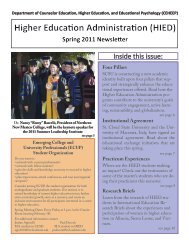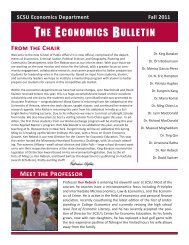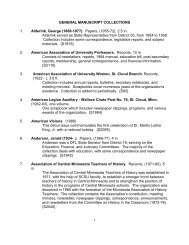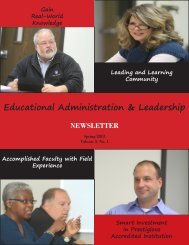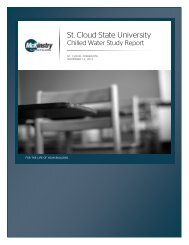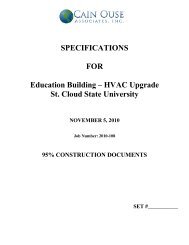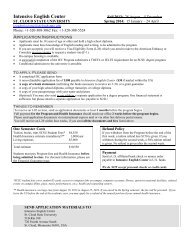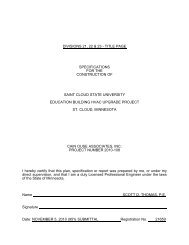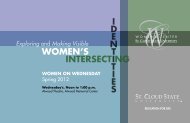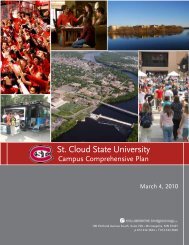2008 Proceedings - St. Cloud State University
2008 Proceedings - St. Cloud State University
2008 Proceedings - St. Cloud State University
You also want an ePaper? Increase the reach of your titles
YUMPU automatically turns print PDFs into web optimized ePapers that Google loves.
Abstracts<br />
Session X Science and Engineering III North Voyageurs<br />
Method Development for Quantification of Ibuprofen in Surface Water by Liquid-Liquid Microextraction/GCMS<br />
Liquid-liquid micro extraction combined with gas chromatography mass spectrometry has been applied to quantification of dilute aqueous<br />
solutions of ibuprofen. This method is based on the solubility difference of ibuprofen in water vs. an organic solvent. The optimal solvent<br />
was determined to be octane which was spiked with dodecane as an internal standard. This experiment was performed using 2mL of a<br />
10ppm ibuprofen in water solution. The extraction was found to be most efficient using an aqueous phase that has been saturated in<br />
sodium chloride. One micro liter of organic phase was used with a stirring speed of 712 revolutions per minute. An exposure time of fifteen<br />
minutes was determined to be optimal in order to obtain adequate peak areas in a reasonable time.<br />
Presentation Index: X3<br />
Time: 4:10 p.m.<br />
Department: Chemistry<br />
Project Sponsor(s):<br />
<strong>St</strong>udent Presenter(s): Gulbranson, Daniel<br />
Jeannot, Michael<br />
Session Y Special Education South Glacier<br />
The Uses and Implications of the Term "Retarded" on YouTube<br />
The meaning and context of the word ―retarded‖ has changed from a label used to identify individuals with intellectual disabilities to<br />
derogatory slang implying a person is stupid or dumb. The use of the word has become part of popular culture in this country. When I<br />
entered the term ―retarded,‖ using a basic search on the video sharing site YouTube, over forty thousand videos were identified. This paper<br />
explored the use of the term ―retarded‖ on YouTube, in an attempt to ascertain how the expression is being used. I compiled a list of the<br />
first four hundred of these videos sorted by ―relevance‖ on the YouTube website. This list of videos was reduced by choosing only videos<br />
with the word ―retarded‖ in the title, videos posted on the website for three months or longer and videos viewed over one thousand times. I<br />
then randomly selected one hundred videos. A second researcher and I watched each video and took notes on the way the word<br />
―retarded‖ was used in the videos and accompanying text. We then coded our notes and identified recurrent themes. These themes related<br />
to how the word ―retarded‖ was used, and fell into the following categories: to criticize or put down a person, to ―make fun of‖ a person or<br />
thing, to educate and to ―have fun.‖<br />
Presentation Index: Y1<br />
Time: 3:30 p.m.<br />
Department: Special Education<br />
Project Sponsor(s):<br />
<strong>St</strong>udent Presenter(s): Johanson, Brandy<br />
Wilkins, Julia<br />
Do Institutions of Higher Education in Minnesota Prepare Future Special Education Teachers to Deal with Terminally Ill <strong>St</strong>udents<br />
and <strong>St</strong>udent Death?<br />
There are many professions in which people must deal with terminal illness and death on a regular basis, for example doctors, nurses,<br />
nursing home staff and emergency medical technicians. Special education teaching fits into this category, particularly for teachers who<br />
work with students who are medically fragile or who have health-related disabilities. A person choosing to work with children who have<br />
these conditions may or may not have been given adequate information and training in their special education teacher preparation<br />
programs to effectively deal with a terminally ill student or the death of a student. Special education teachers need the ability to deal with<br />
student death, on both a professional and a personal level and have the skills to help themselves, their students and other staff members<br />
through the grieving process. Special education teachers are not as likely to experience death on a regular basis as some medical<br />
professions do, but teachers that work with children who have terminal illnesses could use the information provided in the systematic<br />
educational approach that thanatology provides to increase their ability to effectively manage themselves and the people in their<br />
classrooms in relation to dying and death. Research has been conducted to determine if adequate training has been given to professionals<br />
in the medical field to effectively deal with terminal illness and death but little research has been done to assess persons in the field of<br />
special education on the topic of preparation to deal with terminal illness and death. This paper will explore the preparation Minnesota<br />
special education teachers are given in their college preparation programs with regards to dealing with terminal illness and death of a<br />
student in their classroom.<br />
Presentation Index: Y2<br />
Time: 3:50 p.m.<br />
Department: Special Education<br />
Project Sponsor(s):<br />
<strong>St</strong>udent Presenter(s): Saufley, Nancy<br />
Wilkins, Julia<br />
<strong>St</strong>. <strong>Cloud</strong> <strong>St</strong>ate <strong>University</strong> <strong>St</strong>udent Research Colloquium 71<br />
April 22, <strong>2008</strong>



